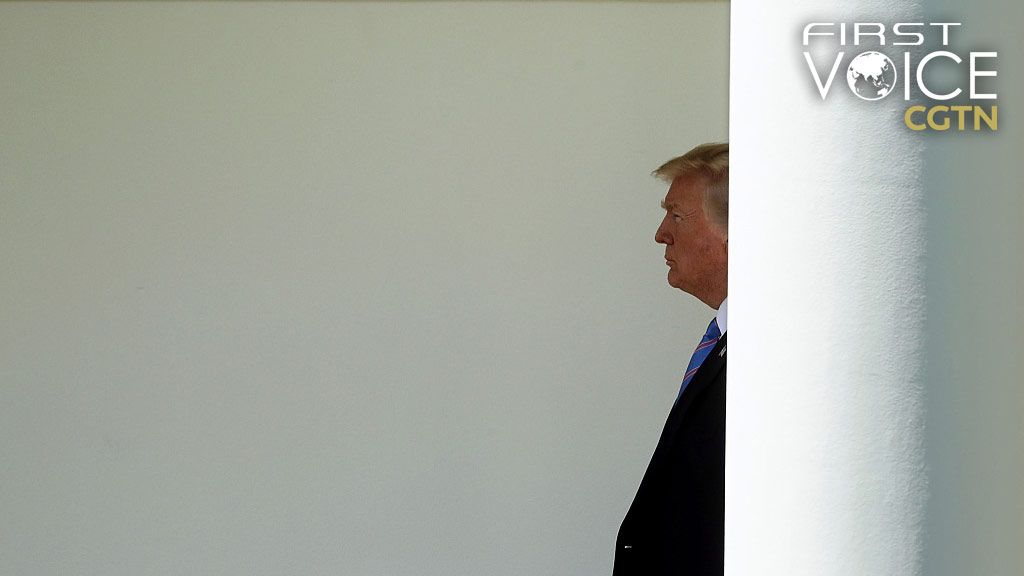
Editor's note: CGTN's First Voice goes beyond the headlines to dissect, examine and analyze hot-off-the-press issues and break down breaking news into simple bits. The daily column offers a Chinese perspective on global current events to help you shape your views on matters that shape your life.
Ben Westcott, a digital news producer for CNN International, authored an analytical article on China-U.S. relationship titled "There's talk of a new Cold War. But China is not the Soviet Union." Published by CNN on January 3, the article contrasts China's current status in the world with that of the former Soviet Union. Through discussions on economy, military, trade, U.S. alliance and space, Westcott tries to convey that China is fundamentally different from the Soviet Union, and the theory of a new Cold War doesn't stand.
It is true that the circumstances are different. As Westcott explains in the article, China neither has a global military projection nor seeks an isolated trading system. It isn't turning its economic prowess into heavy investment in national defense. The U.S. allies are divided, with many working closely with China. And when it comes to space, there is plenty of cooperation taking place between the two countries.
However, the problem in today's China-U.S. relationship is that the differences in circumstances might not matter.
In a recently aired interview clip, John Mearsheimer, professor of political science at the University of Chicago, said that "as China gets more powerful, it becomes a zero-sum game," and as economy grows, the "economic growth can be translated into military power." The re-balancing of the Asia-Pacific strategy in 2011 was the materialization of the fact that the U.S. began to "get really scared about Chinese economic growth," the professor said.
This fear of growth has been on full display in the past year. Politicians in the U.S. have accused many crown jewels of Chinese economic achievements for being "national security threat."

Tiktok is very popular amongst young people in the U.S. but it is coming under heavy scrutiny by the U.S. government. /AP Photo
Tiktok is very popular amongst young people in the U.S. but it is coming under heavy scrutiny by the U.S. government. /AP Photo
Huawei has been banned from the U.S. for the alleged threat it poses to the U.S. telecommunications infrastructure and personal information. Last year, the U.S. Army recruiters believed that Tiktok is an effective way of reaching the younger generation. Then, the Pentagon advised all its personnel to stop using and delete Tiktok on all government-issued phones. And this week, the Coast Guard and Air Force banned the app, following the Navy, Army and the Marines.
The fact that traditional U.S. allies like Germany and France are embracing these apps makes the "national security threat" hollow. And U.S. President Donald Trump's own flip-flops on Huawei has made clear to the world that "national security" is merely a bargaining chip on the table. But, the argument of "national security threat" remains strong within the U.S. government.
This idea is particularly sticky because it isn't born out of reality. As Mearsheimer's theory implies, it is an inherent belief that the China-U.S. relationship is a zero-sum game.
Westcott's article tries to convince the readers that China-U.S. relationship is much more complicated and their interests are more intertwined than the U.S. and the Soviet Union. But, top echelon of the U.S. government isn't preaching a sophisticated and comprehensive view of this bilateral relationship. U.S. Secretary of State Mike Pompeo said last year that China's rise has come "at the expense of American values, Western democracy, and security, and good common sense". Senator Marco Rubio claimed that "China wants to completely supplant America."
When U.S. decision-makers take this simplistic view, the U.S. becomes more isolated. The U.S. government's inability to accept another country's growth impedes its ability to cooperate on an international stage. This in turn would make them seek more declarations of allegiance, making the action of "taking names" not just a rare outburst but the norm of conduct and antagonizing the international community further.
Isolation from each other and a clear divide were the hallmarks of the previous Cold War. Even though today's reality is different, U.S. politicians' conjuring of a psychological us-versus-them framework is harkening back to the old times.
Engagement is a two-way street. China is trying to engage. But without reciprocation from the other side, isolation would be a natural product. Divide would soon follow.
Script writer: Huang Jiyuan
(If you want to contribute and have specific expertise, please contact us at opinions@cgtn.com.)